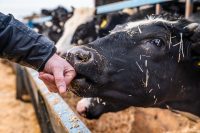COVID-19: Practical guidance for our rural and farming clients #17
Our rural team are the first point of call when client’s financial queries need to be reviewed, addressed, answered and implemented; working closely with those affected by COVID-19.
In the South West, the impact of COVID-19 has presented many of our farming clients with real concerns but also opportunity. If you would like to explore ideas for your own business further, increase your confidence in making financial or tax decisions or just talk your ideas through, then please do give us a call.

1st July 2020
-
Andrew Vickery See profile
Whilst many farming businesses will generally be in a position where they are reclaiming VAT in each period, there will however, be a good number of businesses such as farm contractors or those with diversifications in a VAT payment position.
VAT payments will return to normal on 1 July with the government announcing that the deferral period will not be extended. With the VAT deferral period due to COVID-19 drawing to a close, those that deferred their VAT will need to resume making quarterly and monthly VAT payments after 30 June. If your next VAT return is for period of May 2020 you need to re-instate your direct debit as soon as possible.
HMRC automatically deferred all VAT payments due for the period 20 March 2020 to 30 June 2020, meaning there is no requirement to pay your VAT bill until 31 March 2021. This deferral period covered the following:
- Quarterly and monthly VAT returns’ payments for the periods ending in February, March and April
- Payments on account due between 20 March 2020 and 30 June 2020
- Annual accounting advance payments due between 20 March 2020 and 30 June 2020
HMRC is now encouraging all businesses to re-instate their direct debits in plenty of time, then HMRC can collect the next payment when it’s due. If you don’t do this, you must remember to pay electronically by 7 July 2020.
HMRC has assured that their payment collection software will not attempt to collect the VAT due from the deferral period.
If you find that you’re unable to pay the VAT due at the end of your next VAT period and need additional time to pay, please contact HMRC before the payment is due to arrange a Time To Pay. HMRC have a dedicated helpline for this 0300 200 3835. If you do call, you should quote ‘V1’.
Initially, the rules around the furlough scheme were quite complex with the calculations and legislation. As a result many businesses may have subsequently found they made errors in some of the claims. HMRC have now clarified the position for those that have discovered such errors.
If you made an error in a claim that has resulted in an overclaimed amount, you must pay this back to HMRC.
If you’re making another claim then you can tell HMRC about an overclaimed amount as part of this. When you make your next claim you will be asked whether you need to reduce the amount to take account of a previous overclaim. Your new claim amount will be reduced to reflect the overclaimed amount and you should keep a record of this adjustment for six years.
If you have overclaimed and you don’t plan to submit any further claims then you should contact HMRC to let them know about your error and find out how to pay back any overclaimed amounts. Once you have contacted HMRC you will be given a payment reference number and directed to make a payment.
If you have made an error that has resulted in an underclaimed amount, you should contact HMRC to amend your claim. As you are increasing the amount of your claim, they have stated this will conduct additional checks.
We are being asked by clients about the Tax Treatment of the Coronavirus Job Retention Scheme and employment costs.
Payments received by a business under the scheme are made to offset deductible revenue costs. They must therefore be included as income in the business’s calculation of its taxable profits for Income Tax and Corporation Tax purposes.
Businesses can deduct employment costs as normal when calculating taxable profits for Income Tax and Corporation Tax purposes.
Individuals with employees that are not employed as part of a business (such as nannies or cleaners) are not taxable on grants received under this scheme. Domestic staff are subject to Income Tax and NICs on their wages as normal.
If you are self-employed and claiming on the Self-Employment Interruption Support Scheme (SEISS) it’s important you keep any evidence that your business has been adversely affected by coronavirus.
This means keeping a copy of all records in line with normal self-employment record-keeping requirements including:
- Business accounts showing a reduction in turnover
- Confirmation of any coronavirus-related business loans you’ve received
- Dates your business had to close due to lockdown restrictions
- Dates you or your staff were unable to work due to coronavirus symptoms
- Shielding or caring responsibilities due to school closures.
HMRC have updated their guidance on notifying an option to tax land and buildings during coronavirus (COVID-19) to reflect the temporary extended time limit from the date the decision to opt was made.
This now applies to decisions made between 15 February 2020 and 31 October 2020.
View the guidance on the gov.uk website.
This is a complicated subject so if you’re considering a building development on a commercial property please speak to your adviser first.
In a move to support people across the country to establish more ‘climate-positive’ and sustainable behaviours, businesses and start-ups are able to apply for The Sustainable Innovation Fund to develop smart sustainability-focused projects – they site examples as developing apps encouraging people to cut down their food waste to sustainable biodegradable packaging.
Funding of almost £200 million will go towards developing new technologies. Businesses in any sector are being urged to apply for funding.
Click here to find details on the gov.uk website.
Last week’s ‘Virtual Breakfast’ contained updates on COVID-19 support schemes and financial questions asked by our farming and rural business clients.
We were also delighted to have Agriculture Relationship Director at Lloyds Bank, Victoria Read, with us to discuss bank funding and investments.
The video, a full rundown of questions posed and timeline of answers can be found here.

For more information, or if you have any questions about any of the above, please contact your Old Mill adviser or email enquiries@om.uk.

